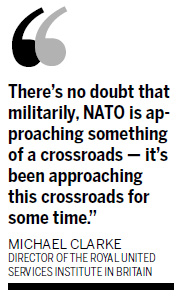Global General
NATO at the crossroads after Gates' blunt parting speech
By Jamey Keaten (China Daily)
Updated: 2011-06-14 08:00
 |
Large Medium Small |

PARIS - The NATO military alliance is facing an identity crisis as its members grapple with just how much its long and often-unpopular mission in Afghanistan and its new air campaign in Libya size up as national interests - or not - when many countries' budgets are under strain.
In an unusually blunt parting speech on Friday, outgoing US Secretary of Defense Robert Gates called on the Atlantic allies of the United States to pay and do more to overcome the alliance's military shortcomings - raising the question: What is NATO today, and what does it need to be?
The allies will be doing some soul-searching in the coming months, with Osama bin Laden dead, many European state coffers squeezed by high debt and slow economic growth, the US drawdown in Afghanistan about to start and tough questions about how long its air campaign over Libya can last.
The alliance has grappled with diverging internal views over whether NATO should be an instrument of "hard" combat missions - generally the US view - or the preference among some in Europe for "soft" power, like "humanitarian, development, peacekeeping, and talking tasks", as Gates put it.
Ever since the Berlin Wall fell, NATO's raison d'etre has been questioned. Now, with its hands in two military big campaigns in Afghanistan and Libya, the doubts about the alliance's future have hit a new crescendo.
Gates pointed to the "real possibility of collective military irrelevance" and called on members to look at new ways of raising combat capabilities in procurement, training, logistics and sustainment.
Michael Clarke, a NATO watcher and director of the Royal United Services Institute in Britain, said the US still needs NATO as a political conduit to Europe - but admitted the alliance is struggling militarily.
"There's no doubt that militarily, NATO is approaching something of a crossroads - it's been approaching this crossroads for some time," he said. Gates, he said, expressed publicly what was long said privately "that NATO's capabilities risk falling below a threshold where they can be effective."
Founded in 1949, NATO was aimed to counter the Soviet Union. While that opponent is long gone, Gates and others say some of the alliance's 28 member states - all European except for Canada and the US - remain too comfortable under Washington's security umbrella.
He said the US share of NATO defense spending is now more than 75 percent, and just four other members - Britain, France, Greece and Albania - spend more than the agreed 2 percent of economic output on defense.
Gates all but thumped his shoe on the table at Friday's NATO meeting in Brussels, saying its future appeared "dim if not dismal" because of Europe's alleged penny-pitching and aversion to combat.
As US military expenditure rose - notably under former president George W. Bush - its share of NATO defense spending swelled. Gates cited an estimate that Europe's defense spending fell 15 percent since 2001.
Jan Oberg, a director of the Transnational Foundation, a think tank in Sweden, said the strains are of Washington's own making: by devoting too much money to defense - or roughly 45 percent of the total $1.7 trillion spent worldwide each year.
"If the secretary of defense of that country tells the rest of the alliance that they are paying too little, the objective truth is that it's a perverse level that the United States is on, and it can forget about ever having the European countries invest as much - because we're not having any military troubles within Europe," he said.
Associated Press
| 分享按钮 |
